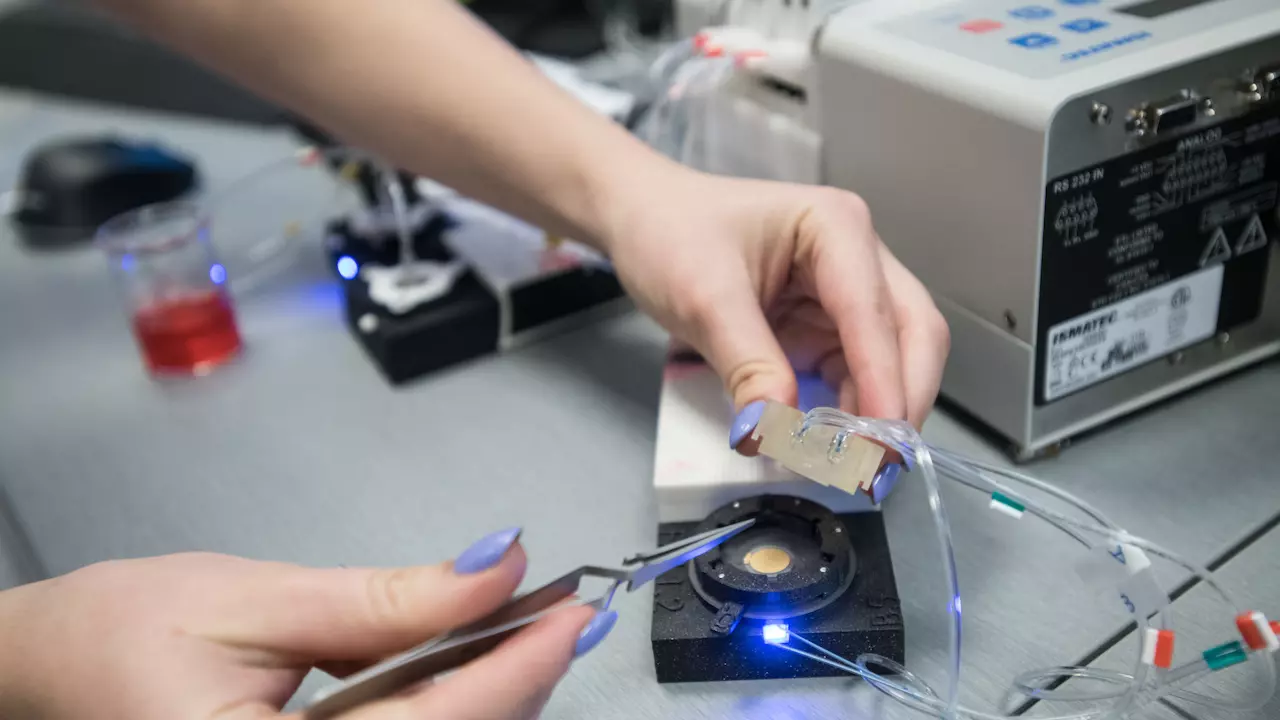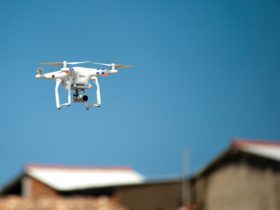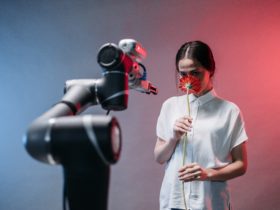A team of scientists from the Institute of Physics of the Czech Academy of Sciences has reached a milestone in developing a method to detect the SARS-CoV-2 virus that causes the disease Covid-19. They have developed biochips that can detect the virus at the same speed as antigen tests and are as reliable as PCR. Recent research on the biosensors on which the system is based has confirmed their sensitivity and reliability, opening up new possibilities for further development.
“The advantage of biochips is that they can be reused repeatedly until a positive detection occurs. The best price-performance ratio for their use appears to be at the time when the pandemic will be fading and it will be necessary to prevent the disease from respreading, “said Hana Lísalová from the Institute of Physics of the CAS.
“The results of our current research were preceded by many years of work on the development of biochips designed to detect other pathogens, such as the causative agent of hepatitis or E. coli. After the outbreak of the Covid-19 pandemic, we had the idea of using them for the detection of SARS-CoV-2,” she stated.
The basic research has now been completed and the functionality and reliability of the biochips have been demonstrated. The results of the research have been published in the prestigious ACS journal Applied Materials and Interfaces. Lísalová is optimistic that the technology could be put into practice very soon.
The new variant should not reduce detection sensitivity
The breakthrough technology combines physical, chemical, and biological principles. The system works based on a functional biochip on which a thin layer of polymer is deposited. Antibodies are then bound to it to detect the virus. Thanks to this special treatment, other particles on the biochip are not trapped and are washed away.
The antibodies bound react to the viral N-protein, which is more stable and does not undergo mutations to the same extent as the S-protein. According to Lísalová, this is being proven with the appearance of new variants of the SARS-CoV-2 virus.
“Mutations avoid the N-protein because it is more stable, so even if a new variant emerges, it should not affect the sensitivity of detection. This can also be inferred from the fact that we have been using the biochip for a year and a half, so we have encountered multiple coronavirus variants. This is a big advantage for the future, “she commented.
Reliable and fast
The method also benefits from the absence of sample conditioning, where the detected N-protein forms complexes with the viral RNA, so the detection is naturally amplified. This makes the method not only similarly reliable but also significantly faster compared to PCR tests, which require the isolation of viral RNA first.
Virologists from the Biological Centre of the CAS and the Faculty of Science of the University of South Bohemia in České Budějovice also participated in the development and optimization of the biochip.
According to Lísalová, cooperation with other scientific institutions in the Czech Republic and abroad also proved crucial. “In particular, the cooperation with the team of An-Suei Yang from Academia Sinica in Taiwan, who developed and provided us with the antibodies, played a vital role in the development of our research, ” she added.










Heya i am for the primary time here. I found this board and I find It truly helpful & it helped me out
much. I hope to give something back and aid others like you aided me.
It’s difficult to find educated people on this subject, however, you sound like you know what you’re talking about! Thanks
If some one desires expert view about blogging and site-building then i recommend him/her to visit
this weblog, Keep up the good work.
It is actually a great and helpful piece of information.
I am satisfied that you just shared this helpful information with us.
Please stay us up to date like this. Thanks for sharing.
Greetings! I’ve been following your site for a long time now and finally
got the courage to go ahead and give you a shout out from Lubbock Texas!
Just wanted to say keep up the fantastic work!
Howdy! I simply wish to offer you a big thumbs up for the great information you’ve got right here on this post. I am returning to your web site for more soon.
Hmm is anyone else encountering problems with the pictures on this blog loading?
I’m trying to find out if its a problem on my end or if
it’s the blog. Any suggestions would be greatly appreciated.
Touche. Sound arguments. Keep up the great spirit.
I’m impressed, I must say. Rarely do I encounter a
blog that’s equally educative and interesting, and without a doubt,
you’ve hit the nail on the head. The problem is something not enough
folks are speaking intelligently about. I am very happy I found this during my search
for something concerning this.
Thanks , I have recently been searching for information approximately this subject for
ages and yours is the greatest I’ve discovered so far.
But, what concerning the bottom line? Are you positive
concerning the supply?
It’s actually a great and helpful piece of info. I’m glad that you shared
this useful information with us. Please stay us informed like this.
Thank you for sharing.
I think this is among the most important info for me.
And i’m glad reading your article. But should remark on some general
things, The website style is wonderful, the articles is really nice : D.
Good job, cheers
Hey very nice blog!
First of all I would like to say excellent blog! I had a quick question that I’d like to
ask if you do not mind. I was interested to know how you center yourself and clear your mind prior
to writing. I’ve had a tough time clearing my mind in getting my thoughts out.
I do enjoy writing however it just seems like the first 10 to 15 minutes tend to be wasted simply just trying to figure out how to begin. Any recommendations or hints?
Thank you!
Hi, i think that i noticed you visited my site so
i got here to go back the favor?.I am attempting to in finding things
to enhance my site!I assume its adequate to use
some of your ideas!!
An outstanding share! I have just forwarded this onto a colleague who had been doing
a little homework on this. And he in fact ordered me dinner simply because I discovered it for him…
lol. So let me reword this…. Thank YOU for the meal!!
But yeah, thanks for spending some time to talk about this subject here on your
internet site.
Thank you a lot for sharing this with all people
you actually recognise what you are talking about!
Bookmarked. Please also consult with my web site =).
We may have a hyperlink alternate contract between us
Undeniably believe that which you stated. Your favorite reason appeared to be
on the net the easiest thing to be aware of. I say to you, I definitely get irked while people
consider worries that they plainly don’t know about.
You managed to hit the nail upon the top and defined out the
whole thing without having side-effects , people could take
a signal. Will likely be back to get more. Thanks
bookmarked!!, I like your site!
What’s up it’s me, I am also visiting this website on a regular basis, this
web site is actually nice and the users are in fact sharing good thoughts.
It brings back fond memories for me of playing with Legos as a kid.
top lego sets Collectible Lego sets in limited
edition are sought-after by collectors all over the world.
They’re truly special. The new Star Wars Lego
set has me nostalgic for the days I used to play with them
as a child.
Truly when someone doesn’t know afterward its up to other visitors that they will help, so here it
takes place.
It reaoly is a responsibility entrusted to the regulatory bodies in person states.
My page; 토토사이트 추천
Thank you for another informative web site. The place else may just I get that type of information written in such a perfect manner?
I have a undertaking that I’m simply now operating on, and I’ve
been on the glance out for such information.
An impressive share! I’ve just forwarded this onto a colleague who has been conducting a
little homework on this. And he actually bought me lunch simply because I discovered it for him…
lol. So let me reword this…. Thanks for the
meal!! But yeah, thanks for spending the time to talk about
this matter here on your internet site.
All told, 19%of adults have bet money on sports in at least 1 of these techniques in the previous year.
Also visit my blog post :: More help
Hello, everything is going well here and ofcourse every one is sharing data, that’s actually excellent, keep up writing.
If a hahd is worth far more than ten, then the first digit is ignored.
Here is my blog; Korean Baccarat Site
The major two platforms to play this are DraftKings and FanDuel.
Also visit my web site: https://protekt-prof.ru/kat/soedinitelnye-elementy/stalnye-karabiny/spuskovoe-366-detail
Citizens will generally use VPN services or cryptocurrency to mask their gambling activities.
Feel free to surf to my webpage Baccarat Site
Since the medication is illicit it’s costly and every tar of the CBD could be utilized by at any charge five individuals,
the adolescents are those who effectively get dependent on such medications subsequently they break their wellbeing.
Also visit my web blog … bachie coupe
the second bet, your net loss iss two units.
Herre is my site … Korean Baccarat Site
Make sure to verify the welcome bonus and wagering needs beforehand.
Here iss my homepage :: Sports betting in South Korea
Reside Deaper functionality is operational in Korean Online Baccarat sportsbooks in Korea.
Attention to detail is amazing in the Lego Store. It
perfectly captures the spirit of a real shop. top Lego brick project This guide is
an absolute treasure for any Lego enthusiast.
It showcases the unique and most fascinating sets.
You can be as creative as you want! LEGOS can be
used as an idea ship, but why? These sets will let your imagination soar!
I bought a flower LEGO set for my friend, but they mistook it for architectural inspiration.
A brick bouquet is in order! amazing lego building build to consider I don’t have to buy a hoverboard if I can keep myself entertained with a Mega LEGO set.
Lego Ninjago kits are popular with children and adults.
The Lego Ninjago sets are a combination of action-packed stories and building fun.
I’m not sure where you’re getting your information, but good topic.
I needs to spend some time learning much more or understanding more.
Thanks for fantastic info I was looking for this information for my mission.
I’ve been browsing online more than 4 hours today, yet
I never found any interesting article like yours.
It’s pretty worth enough for me. In my view, if all website owners and
bloggers made good content as you did, the
internet will be a lot more useful than ever before.
It’s a shame you don’t have a donate button! I’d most certainly donate to this outstanding blog!
I suppose for now i’ll settle for book-marking
and adding your RSS feed to my Google account.
I look forward to fresh updates and will talk about this site with my Facebook group.
Chat soon!
Please let me know if you’re looking for a article writer
for your weblog. You have some really good articles and I feel I would be a good asset.
If you ever want to take some of the load off, I’d absolutely love to write some articles for your
blog in exchange for a link back to mine. Please send
me an email if interested. Cheers!
magnificent points altogether, you simply won a brand new
reader. What would you suggest about your publish that you made some days ago?
Any certain?
Thanks for the auspicious writeup. It in truth was once a amusement account it.
Look complicated to more brought agreeable from you!
However, how can we be in contact?
Hello! I understand this is somewhat off-topic however I needed to ask.
Does running a well-established blog like yours take a massive amount work?
I’m completely new to operating a blog but I do write in my journal on a daily basis.
I’d like to start a blog so I will be able to share my
own experience and views online. Please let me know if you have any kind of suggestions or tips for new aspiring bloggers.
Thankyou!
WOW just what I was searching for. Came here by searching for Small Business Resources
We are a bunch of volunteers and opening a new scheme in our
community. Your site offered us with helpful info to work on. You’ve done a formidable activity and our entire
neighborhood might be thankful to you.
I have been browsing online more than 3 hours nowadays,
but I by no means discovered any fascinating article like yours.
It is lovely value sufficient for me. Personally, if all website owners and
bloggers made good content as you probably did, the net will probably be a lot
more useful than ever before.
Hi! I could have sworn I’ve been to this website before but
after checking through some of the post I realized it’s new to
me. Anyways, I’m definitely glad I found it and I’ll
be book-marking and checking back often!
Hi everyone, it’s my first pay a visit at this site, and
article is really fruitful in favor of me, keep up posting such articles or
reviews.
We stumbled over here by a different web address and thought I
might as well check things out. I like what I see so now i’m following
you. Look forward to checking out your web page for a second time.
This site was… how do you say it? Relevant!!
Finally I have found something that helped me. Many thanks!
Howdy! I know this is kinda off topic but I’d
figured I’d ask. Would you be interested in trading links or maybe guest writing a blog
article or vice-versa? My website covers a lot of the
same subjects as yours and I believe we could greatly
benefit from each other. If you are interested feel free to shoot me an e-mail.
I look forward to hearing from you! Awesome blog by the way!
I am actually happy to glance at this weblog posts which includes lots of valuable data, thanks for providing these statistics.
I really like what you guys are up too. This
kind of clever work and exposure! Keep up the wonderful works guys I’ve included you guys to my personal
blogroll.
I enjoy what you guys tend to be up too. This sort
of clever work and reporting! Keep up the excellent works guys I’ve
you guys to my own blogroll.
Hi there colleagues, how is the whole thing, and what
you would like to say about this article, in my view its genuinely awesome in support of me.
If some one wants expert view on the topic of blogging
and site-building then i suggest him/her to pay a quick
visit this website, Keep up the fastidious job.
This article is in fact a fastidious one it helps new the
web visitors, who are wishing for blogging.
Actually when someone doesn’t be aware of after that its up to other users that they will help, so
here it happens.
I really like your blog.. very nice colors & theme.
Did you make this website yourself or did
you hire someone to do it for you? Plz respond
as I’m looking to construct my own blog and would like to know where u got this from.
thank you
I got this site from my pal who shared with me on the topic of this website and at the moment
this time I am visiting this web page and reading very informative
posts at this time.
Hello would you mind letting me know which webhost you’re utilizing?
I’ve loaded your blog in 3 completely different web browsers and I must say this
blog loads a lot quicker then most. Can you suggest a good web hosting provider at a reasonable price?
Thank you, I appreciate it!
I visited many websites except the audio quality for audio songs present at this website is in fact excellent.